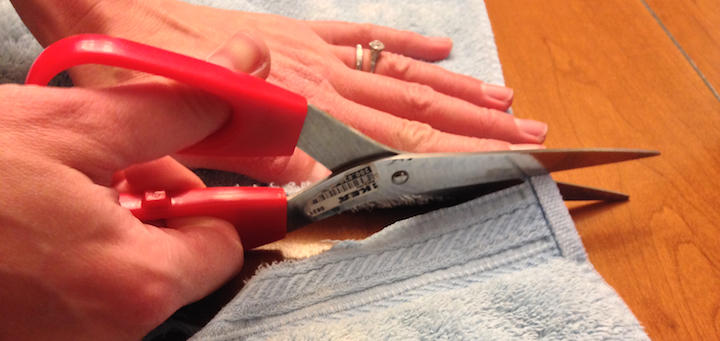I recently put out the query “how do you convince your husband or wife to be frugal?” It’s a question Mr. Frugalwoods and I receive with regularity and it’s one that we’re woefully inept at answering having never done it ourselves. Since we came to the decision to pursue extreme frugality together, we haven’t had the first-hand experience of navigating the challenging waters of aligning divergent financial goals.

And so, I shamelessly begged asked all of you fabulous Frugalwoods readers to share your thoughts, ideas, and opinions on how to get on the same page financially (or not) with one’s partner. Your answers ran the gamut and were thoughtful and heartfelt–I’m tremendously thankful to all of you for sharing your wisdom. I’ve compiled some of the responses we received below in the hopes that this post will serve as a resource for anyone who is struggling financially within a relationship.
What I learned in this process is that, as with most things in life, there’s no one right way to manage finances with your partner. I’m not advocating that everyone try to convince their partner of the benefits of frugality. Indeed, it’s just not going to work for all people in all relationships. So, I’m delighted to collate these wide-ranging comments from readers of all walks of life and all ranges of relationships–from many years married to divorced to figuring it out.
There were two main philosophies reflected in the responses to this question. Philosophy 1 says that it is in fact possible to convert a partner over to the frugal dark side. Philosophy 2 says that it’s not possible to wholesale convert someone to frugality, but that there are coping mechanisms one can employ to foster peace between differing financial approaches in a relationship.
Philosophy 1: You Can Convince A Partner To Be Frugal; Here’s How.
Recognize And Reward Incremental Changes
Quite a few people mentioned the importance of accepting a spouse’s gradual financial changes and demonstrating patience with a partner’s slow progress towards frugality.
Beth explained:
I’m definitely the frugal saver and he is the spendy pants. Slowly but surely, he’s getting better. He used to go out for breakfast and lunch almost daily. Now he takes his breakfast every morning and his lunch 3-4 days a week. He recently agreed to cut the cord and go without cable, and he says he doesn’t miss it at all. Woo Hoo!
Leslie Smith echoed a similar situation with her husband:
I am married to a spender, although he is ever so slowly coming over to my side. That doesn’t mean he still doesn’t make money mistakes (purchasing a high ticket item without talking to me first, etc,), but our goals are slowly becoming more aligned. It helps to have common goals, short- and long-term, which makes saving money much more appealing.
Mustachian Post advised:
Give it time. You would like it to happen overnight but you can’t change someone else’s mindset. It has to happen by itself if you want it to be effective.
Use Math!
Jessica from Too Many Lattes used good old fashioned math to convince her husband of the value of saving more and spending less. She outlined for him how much more quickly they could meet their goals with a higher savings rate and he was sold! Math for the win.
Russ from Adventure Days Dog Treats chimed in on this as well (sidenote: Frugal Hound greatly approves of Russ and his handmade dog treats):
I think the default setting for most men is that emotions are something individual to each person but may not cause a reaction or effect on our side of the fence. But facts are facts, and math is math the world over.
Show, Don’t Tell
Russ from Adventure Days Dog Treats shared this wonderful story about how his wife helped him to slowly, over the years, reform his spendy ways and become a devout frugaler:
It was very important that my wife let me come to this on my own. Never one to henpeck or hassle, she would make salient points and wait for them to penetrate the thick bear skull of her hubby and eventually become lodged in the the massively active and intelligent cortex she knew was in there. Open ended questions abounded:
“How long will the credit card take to pay off?”
“What did that money go towards?”
“Are you sure you want a car payment?”She never TOLD, but she always ASKED….
Trying to appeal emotionally to a super analytical and logical husband is never going to work. The converse is also true of course. Also, realize that you can’t force someone to change, and even if you could, it would not take. People must change of their own accord in their own time. Feeling like you made the change YOURSELF is quite possibly the critical part of the whole deal.
Understanding a partner’s preferred communication style is something Mr. FW and I had to figure out early on in our relationship. My husband is an extremely analytical, data-oriented decision maker whereas emotional arguments tend to appeal more to me. Finding common ground where both of our needs are met in a given decision-making process was a key step for us in advancing our relationship and our ability to jointly plan for our future.
Bev says that in her experience, which includes showing her husband they could pay cash for a car thanks to frugality, that:
I believe when you can show someone with concrete actions what having money in the bank can really do for you, it makes them think twice before spending or accumulating debt.
It was actions that spoke loudest for Kim From Philadelphia’s husband too:
…[my husband] began to routinely hand over money for our joint savings even before we married–he was shocked at how quickly we amassed money–and became excited when we reached various savings goals. Fast forward 15 years: he leaned that we could live a happy, experience-rich life while watching our spending. I think what won him over to the frugal side was the freedom that comes from not stressing about our finances.
Establish Shared Goals
I’ve long believed that having shared life goals in a partnership is one of the central elements to being aligned financially. When you’re in agreement about what you both want in the long term, the immediate process of saving and spending falls into line pretty easily. But, I always wondered if this theory holds up. According to your answers, sounds like it does for quite a few folks.
Our Next Life explained that in their marriage:
We think of frugality as the means, and our major life goal of early retirement as the ends. No point leading a discussion about being frugal with the means—it’s all about the end goal… Once you’re on the same page about the ends, the means fall into line much more easily.
Kate from Goodnight Debt outlined her steps for helping her frugal spouse-in-training:
1) Find a goal. Saving to save is boring. Saving for a purpose is awesome. I love being frugal because it allows me to stress less, travel more and take risks when I want to. He’s onboard with these.
2) Optimize when you can’t cut out. There are great ways to be frugal with all the options today. Store brands vs. name brands, discount cell carriers vs. the big 4. Shop around for insurance. Introduce them to the glory of the library. Many people can’t see that it all adds up in the end. They see it as only $5 or $2 or $10. Gain momentum on your own where their experience doesn’t change. Then when they say it’s only $10, you have proof to the contrary.
3) Accept and celebrate gradual change. It’s not going to change overnight. They may never be as frugal as you, but any step in the frugal direction is a win. With positive reinforcement, it will be a lot easier for change to happen.
Brian C. provided the perfect articulation of how he and his wife ramped up their frugality:
I had always wanted to “make” her more frugal, but I was also smart enough to realize the futility of this… Yet last year, something interesting happened. We both got highly motivated to spend less. We both started looking for areas of our spending to cut back on. She was as motivated as I was. We’ve already cut ~$1,000/mo from our spending without much sacrifice, and can probably find more to save.
Want to know what happened? We started developing some joint life goals. Money was a part of this discussion, but not the biggest part. We started figuring out when we’d like to retire, where we want to live, and what we want to be when we grow up (you know, after our 30’s). Then we did the math and figured out how we could reach those goals. Once we had a firm goal in mind of where we want to be and what we want to do, we both starting finding ways to save. Neither of us feels like we’re scrimping (well, my wife isn’t totally sold on the clothes line) and we feel much better about our spending habits overall.
Philosophy 2: You Cannot Convince A Partner to Accept Frugality.
Accept and Respect Your Contrasting Financial Habits
Julia from Golopomo explained that she and her husband have different recreation spending budgets, due to her husband having relatively expensive hobbies, but that it works for them to have this discrepancy in their spending. Principally, Julia notes that she and her husband have discussed this and both acknowledged this balance of resources.
Wendy shared:
I think part of the key is realizing that you may each have different things you think are worth splurging on. So while I know that a successful marriage is a partnership (no expert, I’ve been married exactly 1 week), it’s also a compromise and a commitment to respecting each person’s individual values and priorities.
Caitlin remarked:
I think there is often a difference in specific values rather than complete disagreement about finances and frugality that can cause discord, and the way to resolve it is the way to resolve most conflict in relationships: respect your partner and try to see where they’re coming from. For example, I knit and my boyfriend plays video games. Video games are not necessarily what I would spend money on, and he would not buy yarn or needles, but we both keep the spending reasonable and let each other be.
Claudia from Two Cup House encapsulated this approach quite succinctly:
We focus on where we align and work toward those shared goals. We stopped wasting our efforts trying to convince or change the other person–unhealthy and counterproductive. Radical acceptance!
You Can’t Change Someone Unless They Want to be Changed
Much as we might want to change our partners, that very idea runs contrary to the fact that each of us is a unique individual who may or may not be receptive to “being changed.”
The Frugal Paragon sagely noted:
The bottom line is that you cannot “get” someone to do something. Ever. You can’t. Stop trying. With a whole lot of listening, you may be able to get more on the same page. More listening than talking. Read the communication chapter in The Seven Habits of Highly Effective People: Seek First To Understand, Then To Be Understood.
Rachel shared that she and her ex-husband weren’t ever able to find common ground with regard to their finances, which ultimately led to their divorce:
After we got divorced, it came as such a MAJOR relief to be able to manage my money without all the constant negotiation and scrutiny… So, for all you couples out there, I would urge the more frugal one to be kind and patient with your less frugal partner. Communicate regularly, show respect, and acknowledge all efforts, big or small. Keep your eye on the forest; don’t fixate on minutiae. Finally, consider your own assumptions and projections as you navigate and discuss your financial issues – it can be so tempting to paint your partner into a caricature that stems from your own perception, without observing the growth and change that can occur so gradually in a person over time.
Yet again, we hear about the value of acknowledging a partner’s gradual change and how important it is to commend them for their efforts.
Leah from Penn states:
I think you don’t. Or, in a different perspective . . . be sure to talk about money prior to getting with your partner. Get on more or less the same page. If you can’t, maybe it’s not the right fit.
Kalie from Pretend To Be Poor leaves us with this salient advice:
Ultimately you can only control what is in your power, and your spouse doesn’t really fit in that category, though we like to think they do!
You Can Work Together to Both Change
If you and your partner are both receptive to making improvements and tweaks to your spending habits, it seems there’s a wonderful opportunity to collaboratively influence one another.
Brooke commented:
This is something we are working at every single month. And no matter how difficult it has been, we have kept working at it. We recently had some major breakthroughs:
1) Budgeting “personal” money for each of us, so budgeting doesn’t feel restrictive
2) Cutting eating out as a category – either the person who wants to go out takes it out of personal money (above), or if it is a special occasion, it will come out of entertainment.
3) Agreeing that groceries are a big problem, which means we continually experiment with them. We are finally getting our groceries below $400.
A couple of key things have helped our communication to get us to this point. Most importantly,we communicate about our budget and spending check-ups via email, so we can do it at our personal convenience rather than when we are tired and cranky after work. We used to fight every month at the budget meetings because they were held grudgingly.
I love the idea of communicating via email with one’s spouse! It works well in the office as it enables people to respond in the time and manner that’s most suitable for them, so it sounds like a great idea within a relationship too.
If You Don’t Agree, Keep Your Finances Separate
This might seem like the nuclear option, but many couples find that separate finances allow them to stay together and not endure daily battles over their money.
Tyler and his wife discovered that keeping independent accounts made for a happy marriage:
We have 2 separate accounts (both having access to the other) and we have the bills separated and each of us deal with our accounts and our bills. She loves it because she now spends way more on decorating the house and stuff like that that matter little to me. I like it because she is making sure she has cash for things now before buying whereas [previously] she was just putting it on credit that we “can pay off later.” I use my additional money to pay off debt and even invest so that eventually my bills can all be paid by passive income.
Liz at Economies of Kale shared that since her relationship is just a year old, they’ve found separate finances advantageous:
We live together, but we have completely separate finances (since the relationship is still so new). We split rent, food, household goods, electricity, internet and date nights down the middle (we use the Splitwise app for this, which is fantastic!), and are responsible for everything else for ourselves. I track my spending religiously, whereas he’s more casual about it, so I don’t know how that will go when we do eventually combine accounts.
Furry Reads notes:
My SO and I keep our finances separate, that way when we want something that the other does not approve of (i.e. him a computer worth $800, and me flying off to New York for a weekend or going shopping), we won’t have any fights about it because it is our money.
Kate from Cashville Skyline also finds value in separate finances:
Honestly, it’s not easy. My partner and I keep our money separate. We both work hard and don’t tell the other one how to save or spend. However, I’ve noticed that some of my frugality has rubbed off on him. And perhaps I’ve changed my perspective, too. I think that happens naturally when you’ve lived together for several years. Slowly, you learn to compromise about spending money.
Give Each Other Allowances
Nicoleandmaggie from Grumpy Rumblings shared that what works well in her marriage is an allowance for her husband, which he manages and allocates himself:
We did a lot of trying to figure out how to make him happy with his spending given our budget constraints (which is how we hit upon the adult allowance for him–he either spends everything or nothing, and allowance allows him to spend everything without feeling miserable). Because I love him and really do want to maximize his happiness.
Mr. SSC of Slowly Sipping Coffee also remarked that having allowances enabled he and Mrs. SSC to navigate their way out of debt successfully:
We implemented allowances to have spending money while paying down my debt and mine was almost always cashed out. It took a few years before I realized things don’t make you happy, they just make clutter. It’s still a struggle for me sometimes but I finally came around. Even with our FIRE-type plan, it took a good year of her talking about it before I realized we could do it and not live in a trailer park eating ramen all the time. Now I’m on board but I still have my moments. Thank goodness for allowances.
Don’t Start, or Continue, a Relationship with Someone of a Differing Financial Ethos
Lance from Healthy Wealthy Income explained that he wouldn’t enter into a relationship with someone on a different financial wavelength:
I couldn’t get past the dating phase with anyone who couldn’t manage their money. If it caused me heartburn before, I didn’t want to take it into the marriage hoping that it could be better. I’m not saying habits can’t change, but better to talk things out and have a good idea of money philosophy ahead of time.
Sarah Jane commented that, through her experience of breaking off an engagement with a financially mis-matched partner and instead marrying someone who shares her views, she learned:
I think one’s proclivity towards frugality might be like temperament in that it’s relatively “fixed,” except not at birth as much as in emerging adulthood… As time passes, I am only more convinced that the tendency towards volunteer simplicity and conservation is more inherent to temperament and early life experiences than anything else. So if you’re really struggling with someone… Stop. Find someone else.
Isabel notes that in her first marriage, she and her husband couldn’t ever get on the same page financially, which ultimately led to their divorce. With her current marriage, she and her husband discussed financial matters at the outset, are still happily married, and have created a “simple but rich life” together.
Compromise and Meet In the Middle
Revanche from A Gai Shan Life shares that initially, she and her husband were financial polar opposites but that they eventually found bliss in the middle:
There was a happy medium to be found. For us, that meant extending spending beyond my extraordinarily tightfisted limits to allow things like travel and eating out, but also set savings rates in stone so that we (he) never lowered our savings for any reason short of job loss or medical emergency. Getting there was not so happy, not for a while, but it was the subject of many long drives up and down the coast of California… I won’t ever say that it wasn’t a lot of work, but it also required a lot of patience and two people willing to compromise.
Sarah from The Frugal Millionaire agrees:
My advice would be to talk and figure out a compromise. If your wife insists on buying coffee and eating lunch out, why not see if you can come with a spending limit each week. Likewise, if your husband has an expensive hobby like shooting or golf, set a monthly spending limit. You can’t deprive your partner nor force them to not spend money, so my only advice would be to set limits that you’re both comfortable with!!
Conclusion

The resounding piece of advice running through almost every comment is that, above all else, communication is paramount. Without an established method of discussing finances with your partner, you’re unlikely to come to any sort of compromise or agreement. Mr. FW and I actually have a formula we sometimes employ for challenging or heated conversations, which I outlined in my Frugal Weirdo’s Anti-Valentine’s Day Manifesto (not that I feel strongly about that holiday or anything… ).
Although Mr. FW and I found that frugality serves to strengthen our relationship by enabling us to ignore the distractions of consumerism and instead focus on forging a genuine connection with each other, it’s not the answer for everyone.
What does appear crucial–for any spot along the frugality spectrum–is establishing shared life goals with your partner. Once you both want the same things out of life, the path to get there becomes quite clear. Set your priorities and your money will follow.
I think there are as many different approaches as there are relationships, and so I hope these divergent viewpoints will help anyone who is currently grappling with how to find a financial path forward with their partner.








I loved reading all of the different perspectives! My husband and I have both joint and separate accounts. We pool the resources to pay all of the bills, but we do have our own bank accounts. Having this balance between shared/individual money has been really helpful for our marriage. I tend to spend my money mostly on craft or education supplies since I homeschool. He needs to spend his money on equipment for work. As long as the purchase isn’t over $100 and all of our bills are paid, we pretty much just trust each other. We also have finance date nights to talk about our finances, which has been really helpful.
That sounds like a great system. Glad to hear you’ve got one that works well for you!
Shouldnt school supplies come out of the joint account if its for educating your children?
What a great compilation of lots of ideas on the topic. Practical tips like using rewards, goals, spreadsheets, and allowances are all good ideas, depending on your spouse’s personality and what makes them tick. I just posted on this topic this week, too: http://www.pretendtobepoor.com/marriage. Just because you can’t make people change doesn’t mean people never make changes!
(Sorry not a nativ english speaker ;P) Very interesting ideas. My fiance and I are going to marry next year in may. I recently reread most of your Blogposts. And I couldn’t find anything about your Wedding. As this is all i ever think about at the moment 😉 I wondered if you had a frugal wedding, too. That would be very interesting, if you want to share. 🙂 My fiance and I set an Budget for our Weeding, which is a lot below what a “normal” Wedding would cost. Last week I was able to find a big part of our Table Decoration for free! And the other part will be a DIY Project from old book (free too). Im a very happy Bride right now 😀
Aline….apologies not necessary. Your English and grammar are excellent and far better than many, many English-speaking, American-born people. Just a thought for you….when my daughter was planning her wedding and the costs were rising, I told her to remember that the wedding will last at most eight hours, not even an entire day. Your marriage will last a lifetime. She changed all of her plans and decided to get married on the beach in Hawaii. It was one of the most beautiful, simple weddings I ever attended, and they were already at their honeymoon destination.
That’s great advice, bev! Very true that the wedding is just one moment in time as compared with the rest of your lives together. Sounds like you’re finding good, frugal solutions Aline–congrats!
This such an awesome compilation of different advice on how to handle this situation! My hubby and I are on the same page about our finances, but I imagine it would be very difficult to navigate those waters if we weren’t. These tips will be so helpful for those who are dealing with that!
It’s so interesting to hear how couples deal with finances. The two most helpful things for us , that were mentioned here as well, have been aligning our goals in life and both of us being open to learning from one another. I’ve learned that it is okay to spend money on things that I value and he has learned that he does need to spend money on things that don’t matter to him.
This is such a great idea for a post! I loved reading through everyone else’s thoughts and tips. It seems like the ultimate takeaway is that there is no right or wrong answer about partner frugality, but that harassing, nagging and belittling the other person probably won’t accomplish anything. (I have a feeling that is good advice for any aspect of a relationship though 😉 hah) When my partner and I started dating, I was 19 (I’m now 23) so money wasn’t really a huge conversation. But because we’ve navigated young adulthood together, we got to learn about finances and our beliefs as a team. It’s actually been a really big blessing and quite interesting to establish our “money beliefs” as a duo. Even though we sometimes disagree, there aren’t any long-standing money habits that need to be worked through because of how young we met. Also, I LOVE Our Next Life’s post about how their marriage is their biggest asset. I couldn’t agree more.
Just like to say thanks… with all its new-to-me bloggers, this post will entertain me through several (home-brewed, frugally-purchased) cups of coffee on this brisk and rainy Seattle morning. Fun!
Oh good, so glad it’s helpful! Thank you so much for sharing your thoughts for the post :)!
I think we can do a better job everywhere with this type of discussion…unless we are satisfied with a 50% divorce rate. Divorce is so expensive financially and emotionally in this country and causes so much heart ache for all involved. Why are we so afraid to get real and have heard discussions about money ahead of time? Unless you are on the same page emotionally and philosophically about money it is going to be a challenge. When you are on the same page and working together it is beautiful. Thanks for bringing up an important discussion that needs to be taken much more seriously in relationships…especially before marriage.
Awesome post! I love how many people you found in the comments who have worked through a mismatch and found shared goals.
Interesting how many different strategies there are! Allowances were a fail for me and Mr. FP, for instance. He exceeded his anyway, and I bought stuff I didn’t need because, hey, I had an allowance! We abandoned the idea. It seems to work great for my sister and brother-in-law (a stay-at-home dad who has, ahem, a history with credit cards) and also for the Goblin Chief, who is awesome and disciplined with his “personal money” and does things like buy a dehydrator with it.
Separate finances seem to work best for dual-earner couples with plenty of money. My sister (in a previous marriage) had the experience of being an earning, but non-breadwinning, spouse in a separate-finances marriage. While in theory, their contributions to the family budget were income-based, in practice, he bought himself a brand-new car with cash while she had to put back the cookies at the grocery store because she was out of money.
Someone else’s magic trick could be a disaster for your marriage, and vice versa. If there is one thing I’ve learned as an adult, it’s that there are an unlimited number of RIGHT ways to do any given thing (marriage, parenting, work) but that a sure way to do it WRONG is to try to do it someone’s way that doesn’t fit you.
PS. Thanks for the name drop. “Sagely” is definitely the nicest thing anyone has said about me all week :-).
You’re very sage! I think of you as sage all the time :)! And, I so agree that there are many different ways to go about achieving what’s “right” for your own marriage/family. It’s not a one-size-fits-all situation with any challenge couples face.
Communication is paramount, absolutely. All of our recent successes came AFTER we established the best method of communication for us. As profiled in the post, our best method of communication is email, where we can open up the spreadsheets and evaluate spending individually, and then discuss “next steps” via an email conversation.
Another point about goals –> We have shared life goals as a set, but it is OK to not have the same top priorities or logic for why it is important. example, I want to pay down debt to be able to afford to have a child (or make it less stressful. My husband wants, first and foremost, to start a business, and he sees paying down debt as way to lessen the risks of that. Same life goals as a SET, but perhaps difference priorities or nuances for why/how we want to get there.
Ahhh, great point on the different priorities within the same goal. I think that makes perfect sense. As long as you’re on the same train going in the same direction, I think the various benefits you accrue along the way will probably be more or less important to each person. Mr. FW and I certainly operate that way too.
I am so lucky Mrs. DisIndebted has the frugal bug… No convincing needed! Great tips for those who aren’t so lucky.
I think this is a great resource but it’s true, at the end of the day every relationship and every individual is different but with open and honest communication (which should be the core of any relationship) anything is possible.
I am learning that compromise is the key. My husband and I have different priorities in a few areas (although our overall long term goals are identical). I am accepting that I can’t change all the things he values. I don’t think arguing over $75 a month for cable is really helpful to our relationship. If it brings him that much happiness, I guess it is worth it. We will find other ways to save. (We did successfully cut our variable spending by about $500 last month, so we are doing ok!)
Compromise is so key! And, very true that some things are just not worth fighting over–I’m all about a peaceful home and sometimes, that means letting stuff slide (of course this approach works best when both members of the couple employ the strategy 🙂 ). And, huge congrats on cutting down $500–that’s awesome!
Allowances have totally worked for us over here. Arguments usually only occur when one person thinks the other person’s spending is ridiculous and their own is not. Because we all have things that are “important” to us. Even a $20/month allowance can make a big difference. Then I can spend my $20/month on Trader Joe’s brownies if I want… or I can funnel mine into savings if I want. And my husband can do what he will with it. No questions asked.
TRADER JOE’S BROWNIES!!!!!! Can you tell I’m pregnant?! 😉
As a clarification– I don’t actually give him the allowance– he manages all of that himself. My only input was at the beginning (and at career changes) about how much we could afford. We can afford more now, but he’s happy with the current amount. https://nicoleandmaggie.wordpress.com/2011/01/17/in-praise-of-dhs-adult-allowance/ has more details.
Thanks for the link!
Thanks for making that change!
Ahh gotcha, thank you for the clarification!
Good Job – all of you! Great insights and sharing. Loved reading how you put it together, Frugalwoods!
I do agree that communication matters because people have different short-term and long-term goals. Some people don’t find value in saving because there is no immediate gratification. Once I realized this about my husband, I found a small budget for little short-term treats made him more willing to be frugal with our overall budget.
I’m older than most of the commenters, and have been married for 38 years. I had an early marriage to a spendy pants, that ended due to our incompatible financial goals after just 2 years. In my lasting marriage we keep our money separate, though in joint accounts. We are each savers, and this has served us well over the years. We have two homes without mortgages, sent our daughter through a private college without borrowed money, paid cash for her wedding ( a huge out door party that cost about 20,000 ten years ago, helped her purchase her first home, and we travel a few months a year in our RV. All of this on a teacher’s salary ( me) and a phone company tech ( him). We have always spent way less than we made, and both have an unbreakable habit of saving. Though my husband retired at age 42, I continued to work til my late 50’s. Even though we have been retired for several years now, we have not touched our retirement savings and continue to save, mostly because we are rather content with how we are living. I love reading the FW blog as it reminds me of our more frugal days ( we really have relaxed our frugality a bit as we have gotten older and major goals have been accomplished)
That’s wonderful! You’ve truly achieved a lot through frugality–congratulations! Thank you for sharing this.
I had to be out of town last week for work, and while gone my husband took my car into the shop for a much-needed repair. I nearly teared up when he said he had looked for and found a coupon for the repair beforehand–not because of the savings, but because it showed that he’s been paying attention to all my couponing and rewards-stacking that has taken so much of my time and energy over the last few months. It was awesome that we saved 10% on the car repair, but honestly his action showing that he acknowledges what I’ve been doing and finds it valuable is such an amazing show of support. 🙂 Reason number 8,056 that I’m glad I married this guy!
That’s awesome!
Love it, and thanks for highlighting my comment!
Love all of these ideas! My husband hasn’t always been frugal, but over the past several years I have noticed that he has changed an incredible amount. Now, it’s usually me who he is trying to convince haha!
I think you said it best here: “…as with most things in life, there’s no one right way to manage finances with your partner.”
Boom, drop the mic. Put another way, just be the best person you can and love your partner for the person he or she is. Luckily Mr. BB and I are on the same page financially, but if he wanted to spend more I’d deal and just focus on how nice his butt looks in jeans.
Haha, so true!
This is quite the compilation of stories! AJ and I have been dating for a few years now and have kept separate finances. We’ve haven’t really discussed what we would do going into a marriage…
As it stands now, we split the apartment and food. AJ enjoys eating out and takes me out for a meal every week or two. Our agreement is because he values it more he buys. Of course that’s not set in stone and one of us will grab the snacks on a bill or something and it’s not a big deal. This way I can be more focused on aggressively increasing my personal savings rate without making him feel guilty for something like a gadget he really wants (and can afford).
I think I’m rubbing off on him anyways. He’s starting to realize that my laser focus still allows me to pay for my fancy bouldering gym membership, organic grass fed steaks (when I do get steak), and pretty notecards to send to my mom ‘just because’. I’m certainly not depriving myself and I’m still achieving a roughly 55% savings rate. I make less than he does (I’m doing quite well but he has a phd and gets paid for it) and it’s sinking in that it’s even easier for him to save the same amount.
In any case we’re on a good track and have discussions about future goals. I think our open lines of communication will help us through any transition into a mixed account or will keep it fine if we decide to stay separate!
Shared goals and open communication are both paramount–sounds like you two are on a great trajectory!
Thanks for the link!
To add to the comment: We actually kept separate finances for a while, even after marriage, and slowly integrated after we’d discussed joint goals and how to reach them. It was important not to rush into anything that made one or the other TOO uncomfortable immediately but equally important to keep changing incrementally until we were both happy. I always knew we’d be happiest when I ran the books 😉 But we do use allowances: we get an almost equal annual allowance for spending on whatever we please and it’s mostly judgement free!
Nice! The judgement-free aspect is so important within a partnership–thank you for mentioning that. Not good if there are bad feelings/grudges over how the money is being handled.
Great selection of stories, and it just shows all the many different ways money can work for couples. We have been married over 10 years and have joint accounts, we plan our budget each month together. I think each couple has to find a system that works for them.
Mrs. Frugalwoods or Commenters,
I’m sorry my question doesn’t have anything to do with the topic at hand, but I need your input. My husband and I were invited to a Sweet Sixteen in a semi fancy place. It’s for the daughter of a high school friend. In high school were best of friends but then we kind of lost touch with each other but remain friendly throughout the years. I am still very fond of her and her daughter (her husband not so much). Anyway, this festivity will cost us around $200 (all together) since we have to either dress in all black or wear Halloween costumes and, of course, we have to buy a gift (around $100). I turned down the invitation and this is where maybe I have cross the line between being frugal to cheap. Mrs. Frugalwoods , we certainly have the money in savings that is geared towards a retirement home purchase in about seven years or so. It takes us about a day to make $200 and lots of frugal efforts to put it away since we are cash flowing $7K every 5 months for our son’s college education. Living in New Jersey (high cost of living) does not help our efforts a lot but we make our savings happen. I will, at a later time, make sure to drop off a birthday card with a gift card. Was I wrong to turn down the invite? As a disclaimer, I don’t think I would have enjoyed this event that much. Their circle of friends are not my cup of tea. I don’t want to be cheap and I feel a little guilty.
Attendance and spending money for things that other people invite you to are NOT REQUIREMENTS!!!! Do not feel guilty for a second.
I’ve spent about 5 years trying to convince my immediate family to forego xmas gifts in favor of just getting together for great food….. to no avail….. Now I just do not participate in that part of our get together every winter. If I can get over the guilt of the strange looks and stares as I sit down and watch the rest of them flush their money and future peace of mind down the toilet to exchange earth ruining crap they don’t need, I can do anything!! 🙂
I agree with Russ here. You’re not required to attend everything you’re invited to and I see nothing wrong with politely declining and sending a nice card later. Life’s all about choices and this is just a choice you made, and it sounds like it was absolutely the right one for you. No reason to attend and feel resentful and grumpy over the money spent–better to do what feels right for you and your goals. You also don’t need to disclose to them why you declined–that’s your own personal business entirely. Cheer up, frugal friend, don’t feel guilty!
Also helps if your partner has the same insight as you (My partner is cheap on some ways, I am on some ways too) 🙂
Great post! My wife and I have been married for 23 years (been together almost 30 years) and you are right, communication is the key!
My wife has a finance management background and she keeps telling me to be frugal as we already have kids. I think our situation taught me to be frugal and I know this would give good results in the future. I am glad that my wife is very supportive and teaches me how to do budget and manage money well.
My partner is the spendypants in our relationship. I count every dollar. He falls into the trap of spending more as he gets raises. A few months ago he dropped $2000 on a new computer without batting an eyelash, and then last week when I suggested a ski day he said it was not in the budget. This is definitely a huge point of tension for us. Your point about how we were raised is very true. I was raised in a well-off family (two business-owners), but only well-off because they knew how to save and manage money. He grew up with parents living paycheck to paycheck and spending anything extra right away. Unfortunately it’s hard not to sound like a nag…
I really like this, it’s wonderful to read stories from others. I’m doing the Uber frugal challenge at the moment, I’m pretty opposite to my husband and money causes me stress all the time, though I’m trying and learning. We separate our money and he’ll buy something like shoes and I’ll have money to travel and shop at thrift stores with a friend. It’s a journey.